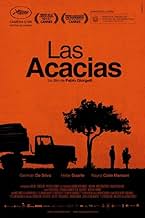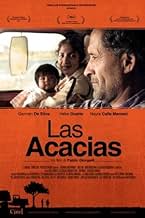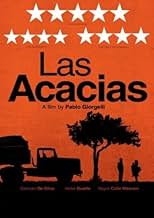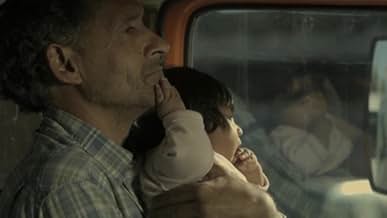IMDb रेटिंग
6.9/10
2.5 हज़ार
आपकी रेटिंग
अपनी भाषा में प्लॉट जोड़ेंReluctantly, a dour long-distance truck driver agrees to give a lift to a Paraguayan single mother and her five-month-old daughter to Buenos Aires. Can the palpable silence soften up the tac... सभी पढ़ेंReluctantly, a dour long-distance truck driver agrees to give a lift to a Paraguayan single mother and her five-month-old daughter to Buenos Aires. Can the palpable silence soften up the taciturn trucker's sullen heart?Reluctantly, a dour long-distance truck driver agrees to give a lift to a Paraguayan single mother and her five-month-old daughter to Buenos Aires. Can the palpable silence soften up the taciturn trucker's sullen heart?
- निर्देशक
- लेखक
- स्टार
- पुरस्कार
- 19 जीत और कुल 22 नामांकन
Germán De Silva
- Rubén
- (as Germán de Silva)
Matilde Jazmín Mamani
- Prima Anahí
- (as Matilde Jazmín Quispe Mamani)
Odón Morán López
- Camionero Paraguayo
- (as Odón Morán Lopez)
Darío Luchetta
- Camionero en asado
- (as Darío Lucchetta)
Yanina López
- Hija dueña parrilla
- (as Yanina Paz López)
फ़ीचर्ड समीक्षाएं
A truck driver hauling lumber from the forests of Paraguay to the markets in Buenos Aires is required by his boss to take a woman and her child with him. He is none too pleased, but as they travel on the mysterious 'something' happens. Not much of a story-line on the face of it, but as we journey with them we see the gradual, almost imperceptible, emergence of bonds of affection that could be turning to love.
The tale is told with very little dialogue, few settings (for most of the time we are in the truck cab) and no music. But the effect is enthralling. The acting is uniformly strong; you never doubt that you are watching 'real' people.
Of particular note is that of the three leading actors, the one who puts in the most remarkable of the excellent performances is the infant (played by Nayra Calle Namani, who could not be more than a year old). I would love to know how the director and the adult actors managed to coax this child into behaving as it does. It's magic!
This movie has a simplicity and honesty that is very moving. The faces say so much without words, so unlike the theatrical, fake emotions displayed in the previous movie I saw, The Deep Blue Sea. The images stayed with me well after I had left the theatre.
(Viewed at Screen 3, The Cornerhouse, Manchester, UK 04.12.11)
The tale is told with very little dialogue, few settings (for most of the time we are in the truck cab) and no music. But the effect is enthralling. The acting is uniformly strong; you never doubt that you are watching 'real' people.
Of particular note is that of the three leading actors, the one who puts in the most remarkable of the excellent performances is the infant (played by Nayra Calle Namani, who could not be more than a year old). I would love to know how the director and the adult actors managed to coax this child into behaving as it does. It's magic!
This movie has a simplicity and honesty that is very moving. The faces say so much without words, so unlike the theatrical, fake emotions displayed in the previous movie I saw, The Deep Blue Sea. The images stayed with me well after I had left the theatre.
(Viewed at Screen 3, The Cornerhouse, Manchester, UK 04.12.11)
You don't know what they're thinking, you don't know how they're feeling, you can only guess. That's what makes this film intriguing and gives a "real life" feel to it. There is no background intrusive music, just the hum of a timber lorry lumbering (!) on the highway to Buenos Aires with its human cargo of man, woman and baby. One of the adults seems to have a lonely life without a family, the other one is part of a large and loving family, but there are hints of problems in their backgrounds. By journey's end you are hoping that all three will share a happy future together. By the way, there's no violence and only one brief bit of swearing.
A middle-aged truck driver's long years of hauling lumber from Asuncion, Paraguay to Buenos Aires is etched on his grizzled face. Looking as if he hasn't shaved in weeks, maybe months, his body language displays a passive solitude, as if he has become reconciled to a world of emptiness. Winner of the Camera d'Or for the best first feature in Cannes, Pablo Giorgelli's Las Acacias is a work of deceptive simplicity, a film that captures the essence of human longing mostly through facial expressions, glances, and gestures. Though it is mainly shot inside the cab of a truck and has very little dialogue, it never feels claustrophobic or dull, its natural performances allowing us to feel as if we are observing events in real time.
The driver, Rubén (German de Silva), is transporting a load of acacia wood to Buenos Aires and has agreed to bring Jacinta (Hebe Duarte), a young Paraguayan woman with him at the request of his boss. When he finds out that the woman, heavily loaded down with suitcases, is also bringing her five-month old daughter, Anahi (Nayra Calle Mamani), he says nothing, but the annoyed look on his face tells the story. Nothing is said for the first thirty minutes as they begin their 1500 kilometer journey, but the silence is not oppressive. Rather, there is simply quiet as the languid motion of the truck sways to the rhythm of the road. Giorgelli said that "I wanted you to feel the fatigue of this long journey," and we do. It is long but never tiring, however.
As the camera reflects on the passing scenery and the images the driver sees through his rear-view mirror, we observe the eyes of the driver, his passenger, and the baby whose look is the most expressive of all. We know nothing of his background or that of the woman's. Ruben's frozen inability to express emotion begins to melt, however, as Jacinta's warmth and the baby's sweet smile awakens in him a sense of his lost humanity. During the course of the trip they begin to open up, slowly revealing their troubled past. He tells Jacinta that he has a son that he hasn't seen in eight years, and she tells him that Anahi has no father.
Jacinta talks to her daughter in the ancient Guarani language and Ruben asks her to translate. When Anahi begins to cry, Rubén quiets her by giving her a cup to play with, and a barely articulated affection emerges. Written by Salvador Roselli, Las Acacias is a film of emotional richness that has no extraneous conversation, enigmatic symbolism, or background music. It is a film where nothing happens and everything happens, that understands that silence alone, in the words of British author Karen Armstrong, "is appropriate for what lies beyond words." A work of deep and abiding humanity, Las Acacias is one of the best films of the year.
The driver, Rubén (German de Silva), is transporting a load of acacia wood to Buenos Aires and has agreed to bring Jacinta (Hebe Duarte), a young Paraguayan woman with him at the request of his boss. When he finds out that the woman, heavily loaded down with suitcases, is also bringing her five-month old daughter, Anahi (Nayra Calle Mamani), he says nothing, but the annoyed look on his face tells the story. Nothing is said for the first thirty minutes as they begin their 1500 kilometer journey, but the silence is not oppressive. Rather, there is simply quiet as the languid motion of the truck sways to the rhythm of the road. Giorgelli said that "I wanted you to feel the fatigue of this long journey," and we do. It is long but never tiring, however.
As the camera reflects on the passing scenery and the images the driver sees through his rear-view mirror, we observe the eyes of the driver, his passenger, and the baby whose look is the most expressive of all. We know nothing of his background or that of the woman's. Ruben's frozen inability to express emotion begins to melt, however, as Jacinta's warmth and the baby's sweet smile awakens in him a sense of his lost humanity. During the course of the trip they begin to open up, slowly revealing their troubled past. He tells Jacinta that he has a son that he hasn't seen in eight years, and she tells him that Anahi has no father.
Jacinta talks to her daughter in the ancient Guarani language and Ruben asks her to translate. When Anahi begins to cry, Rubén quiets her by giving her a cup to play with, and a barely articulated affection emerges. Written by Salvador Roselli, Las Acacias is a film of emotional richness that has no extraneous conversation, enigmatic symbolism, or background music. It is a film where nothing happens and everything happens, that understands that silence alone, in the words of British author Karen Armstrong, "is appropriate for what lies beyond words." A work of deep and abiding humanity, Las Acacias is one of the best films of the year.
A visual narrative on ordinary folk with a simple but instantly recognisable theme - loneliness. Argentina of late has produced some magical road films featuring the lives of everyday characters - and they are all a joy to watch. It matters not that the dialogue, what little there is of it, is in Spanish. It could be a silent film or dubbed in Arabic. The film speaks for itself. It is so well crafted. A roughneck lorry driver who has travelled the highways of Argentina for 30 years and used to his own space, is ordered by his boss to take one of his journeys south to Buenos Aries with a passenger - a young mother and child. Gradually, as the journey progresses and he becomes more and more frustrated with the noise and demands of the child, but a bond slowly comes through. This is a very touching film and very well made. The open road is shown not as dramatic backdrop in panorama - but as a close-up with each of the characters in the shot. There are a number of comments made by reviewers here that liken the film to watching paint dry etc. I think these people went to the cinema expecting another Die Hard, Steven Seagal, Van Damme, Terminator shoot em up Hollywood rubbish. Suggest that in future they read the poster before venturing further.
Cinema isn't just there to entertain (or make money) it is also to educate and generate thought. Well recommended piece of social realism.
Cinema isn't just there to entertain (or make money) it is also to educate and generate thought. Well recommended piece of social realism.
I saw this by mistake on the UK TV channel Film 4. I am generally a fan of the Steven Segal school of movies, so you may be surprised that I found this film so powerful and enjoyable at a deep level. As other reviewers have written, very little happens. A lorry driver takes a mother and her baby daughter across Argentina and that's about it! This film is like a flower unfolding, you can't see anything happen but at the end there is something wonderful and beautiful that was not there before. The director was very brave and allows the film to drive itself rather than be driven by any need to pander to external pressures. It rings so true. I am a bit like Ruben the driver, unable to express what is in his heart, which made it a film that I identify with in a way I rarely do. The baby is brilliant! Give this film a chance, it will richly reward you!
क्या आपको पता है
- ट्रिवियाFilmed in five weeks between Paraguay and Buenos Aires.
- कनेक्शनFeatured in The Smallest Red Carpet, But the Biggest Heart (2011)
टॉप पसंद
रेटिंग देने के लिए साइन-इन करें और वैयक्तिकृत सुझावों के लिए वॉचलिस्ट करें
विवरण
- रिलीज़ की तारीख़
- कंट्री ऑफ़ ओरिजिन
- आधिकारिक साइटें
- भाषाएं
- इस रूप में भी जाना जाता है
- Las Acacias
- फ़िल्माने की जगहें
- उत्पादन कंपनियां
- IMDbPro पर और कंपनी क्रेडिट देखें
बॉक्स ऑफ़िस
- US और कनाडा में सकल
- $6,000
- US और कनाडा में पहले सप्ताह में कुल कमाई
- $6,000
- 9 सित॰ 2012
- दुनिया भर में सकल
- $3,55,979
- चलने की अवधि
- 1 घं 22 मि(82 min)
- ध्वनि मिश्रण
- पक्ष अनुपात
- 1.85 : 1
इस पेज में योगदान दें
किसी बदलाव का सुझाव दें या अनुपलब्ध कॉन्टेंट जोड़ें




















